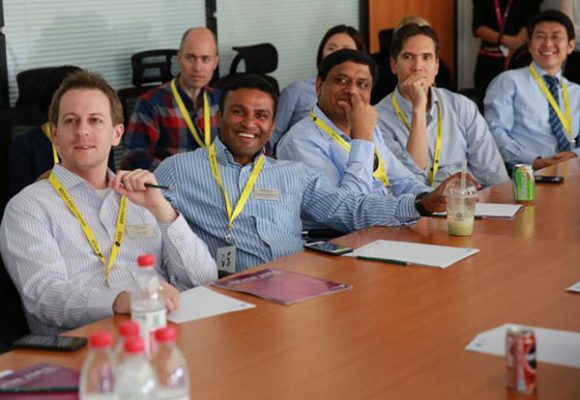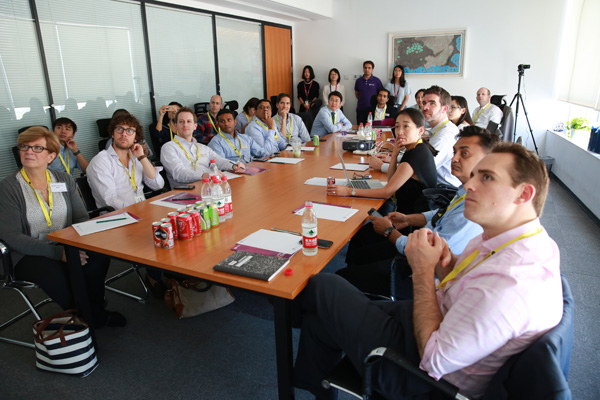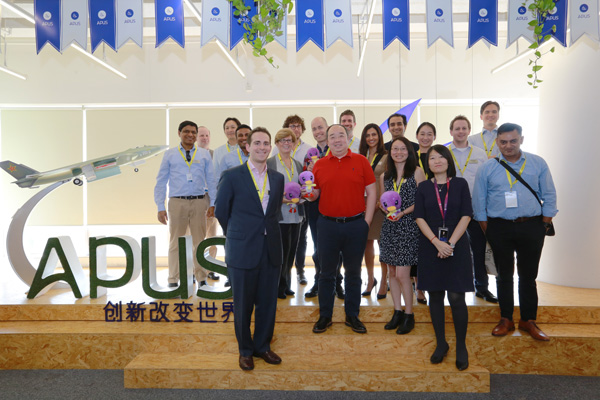
The trend of innovation and entrepreneurship in China has sparked strong interest from foreign businesses and academia.
In a meeting room on the 42nd floor of a skyscraper in Wangjing Soho, Beijing, about 20 foreigners listened attentively to representatives from a fast-growing company who shared the company’s experiences in going global.
They showed strong interest on how the company – named APUS Group – has become a unicorn within three years since it was set up, by providing a user system on Android mobile phones. A unicorn refers to a company with a market value of over $1 billion.
The foreigners were students attending the MBA program for executives at Wharton School, University of Pennsylvania, the world’s first business school.
Bernadette Birt, executive director of Wharton MBA Program for Executives, said she was leading 60 students on the China tour for the course of innovation and entrepreneurship in 2017. Karl Ulrich, vice-dean of Entrepreneurship and Innovation at Wharton, is accompanying them.
“We are going to visit a total of 12 companies,” she said in an interview with chinadaily.com.cn, adding that Huawei, Alibaba, Perfect World, VIPKID were on the list.
The Tsinghua X-lab, a university-based education platform designed to foster student creativity, innovation and entrepreneurship, is also on the visit list, she added.

“This is the fourth year the Wharton School, University of Pennsylvania has organized such tours with the help of the Penn Wharton China Center,” Birt said.
She added she was impressed by China’s innovation and entrepreneurship.
“The growth of new ideas and innovation is amazing,” she said.
“The infrastructure of innovation and the support for entrepreneurs has greatly accelerated. It seemed to grow much faster year over year..”
Birt said she was particularly impressed by innovation and growth in the service sector, such as gaming, entertainment, education and fintech.
She added she hoped to see more cooperation among companies in the United States and China.
Expressing the willingness to cooperate with Chinese companies, Charles K. Herman, chief medical executive of US health company Lehigh Valley Hospital-Pocono and a student of the MBA program, said the government policies play a “huge role” in stimulating innovation and entrepreneurship.

“China has become one of the world’s two biggest economies. It is also one of the two major engines of the global internet market,” said Li Tao, founder of APUS Group.
“The Chinese government has granted a lot of policy and resources support for innovation and entrepreneurship, creating a favorable environment for the fast growth of Chinese startups,” he added.
Premier Li Keqiang called on mass entrepreneurship and innovation for the first time at the Annual Meeting of the New Champions, also known as Summer Davos, in North China’s Tianjin in September 2014. Since then, the country has rolled out many policies supporting new businesses and facilitating innovation. As a result, solid progress has been made in innovation and business creation.
In this year’s Summer Davos, held in Northeast China’s Dalian city in June, Li said the number of market entities in China increased by a daily average of 40,000 in the past three years.
During that period, 14,000 enterprises were registered every day on average, with about 70 percent of them active in business, and the number of new enterprises rose to 18,000 a day in May this year, according to Li.


